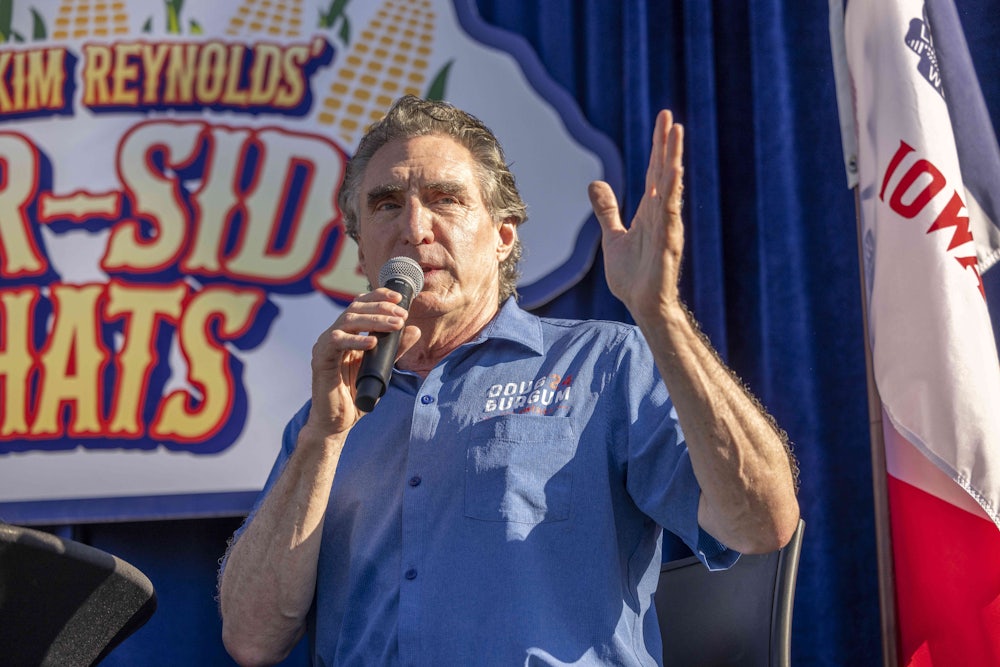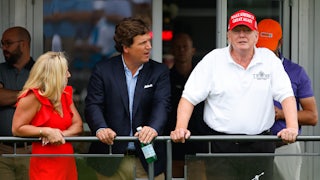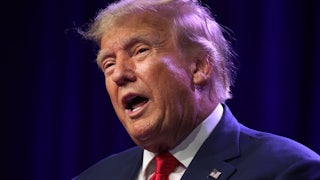Traditionally, the Republican Party is the party of free markets: the one that recoils at the idea of mandates or restrictions imposed from the top down. This long-standing libertarian streak has been at the core of the campaigns of many of the GOP’s leading presidential candidates: Vivek Ramaswamy heralds his plans to fire civil servants en masse, while Florida Governor Ron DeSantis has made his war against Covid mandates a central part of his pitch. But the two men, along with almost every other Republican running, are going along with the debate criteria that have been imposed by the Republican National Committee—the better to ensure that these candidates only appear in “sanctioned” debates this cycle.
The qualifications for Wednesday night’s debate require participating candidates to have received donations from at least 40,000 individuals, as well as hit 1 percent in either three qualifying national polls—or two national polls and two early state polls, each of which have to meet a slew of specifications. For example, the Ann Seltzer poll of Iowa, which is considered the gold standard in measuring public opinion in the Hawkeye State, doesn’t count, but polls from Trafalgar, which wrongly predicted a “red wave” in 2022, might.
The result skews the playing field. Candidates now have to scramble to hit their donor totals and take steps to convince people to send them money—even if they don’t really need it. For example, North Dakota Governor Doug Burgum, a millionaire who is self-financing his campaign, sent a $20 gift card to everyone who donated a dollar to his campaign. The RNC has also prompted a constant stream of candidates scrambling to appear on cable television, where they repeat their campaign website text ad nauseam in hopes of coaxing a few additional new donations from viewers.
This isn’t the first time parties have imposed a combined polling and donor threshold for debates. The RNC, in fact, is borrowing from the model that the Democrats used in 2020 to corral a field of over 20 candidates. That effort led to some strange results as well: There were debates in which candidates such as Montana Governor Steve Bullock and Colorado Senator Michael Bennet were excluded from the stage while more marginal figures like Andrew Yang were allowed to participate.
But it still represents a break from past practice: As recently as 2012 for Republicans and 2008 for Democrats, the national party did not exercise such a direct role in sanctioning debates. This not only led to curiosities like a 2011 Lincoln-Douglas-style debate between Newt Gingrich and Herman Cain but also some of the more memorable moments in the modern history of such debate-stage encounters, including Ronald Reagan’s well-known 1980 quip, “I paid for this microphone, Mr. Green,” in response to moderator Jon Breen’s interruptions. (Reagan did technically pay for the microphone in question: He personally underwrote that 1980 affair so as to allow The Nashua Telegraph the opportunity to host a debate after the Federal Election Commission initially balked at the idea. He did, however, flub Breen’s surname.)
Tim Ryan, a longtime congressman from Ohio, who managed to make the first two debates in 2020 but was excluded thereafter, described having to clear the donor threshold as “insanity” to The New Republic. Ryan, who lost a bid for U.S. Senate in 2022 and is currently leading a national advocacy group called We the People, believes that the very idea of donor thresholds turns the nature of the presidential campaign upside down. “You should be in a coffee shop and shaking hands and doing town halls … then you get on TV, and you have got to figure out, ‘How can I get my website out in a three-, four-minute interview and hopefully get a few people that send me a dollar?’”
For Ryan, the practice of hustling for money in that fashion detracted from the entire process of running for president. What’s more, he says it gamed the system. Ryan says that the system should flow in the same manner as sports teams rising to the top over time: They “have practices; the best players emerge, and some [get] cut from the team … but you prove yourself day in and day out.” In the same way, Ryan says, candidates should prove themselves to voters by competing to have the best ideas, as opposed to the best gimmicks. As Ryan argued, Trump won the nomination in 2016 by proving himself to voters in debates. In that cycle, the RNC did not impose any donor thresholds on candidates and allowed every viable candidate to debate—although some of the lower-polling candidates in that truly overpopulated field were consigned to a “kiddie table debate.”
Not all the Republican candidates on the 2024 bubble have voiced frustrations with the process. Perry Johnson, another self-funding candidate who has been excluded from many polls, told The New Republic that he was confident that he would be onstage and dismissed any issues with the RNC’s criteria. “In America, you overcome adversity. And I believe I will,” said Johnson. “What’s the history of America? What’s the foundation of America? It’s almost the history of people doing the impossible.”
For Johnson, whose 2022 gubernatorial campaign in Michigan was foiled by submitting fraudulent signatures to get on the ballot, this was one more obstacle he was confident he could overcome. After all, he said, “If I can’t do enough to overcome these obstacles, I shouldn’t be president.”
On Monday night, the RNC announced that Johnson didn’t qualify.
For all the talk about which candidates would or would not make the cut, the criteria have, so far, presented few impediments to most of the field. Even the GOP’s decision to require candidates to sign a loyalty pledge has been dismissed by one Republican participating on Wednesday, former New Jersey Governor Chris Christie. The longtime Trump ally turned virulent critic described the pledge as “useless” and “nonsensical theater.” He paid lip service though and signed it anyway.
Daniel Schlozman, a historian of political parties at Johns Hopkins University and co-author of the forthcoming book The Hollow Parties, argued that asserting this level of control over the debate process is part and parcel of an effort by political parties “to make themselves relevant … and present themselves to party actors and public actors as relevant.” That said, he noted a certain irony in the effort, as imposing debate criteria only served as more sign of “the weakness of parties … because the ability to keep people who don’t matter off the stage is not real power. This is fake power.”
After all, beneath all the squabbling and frustration with the debate criteria, there’s one fact that stands out: The GOP has no power to compel Donald Trump to appear on the stages of its sanctioned debates—even its vaunted loyalty pledge lacks teeth. In 2016, a number of the candidates who signed a loyalty pledge did not end up voting for Trump, including Jeb Bush, John Kasich, and Lindsey Graham.
At least for now, this is the extent of the RNC’s power. It can’t do a thing to rein in Donald Trump, but at least it can always crack the whip on Perry Johnson.






